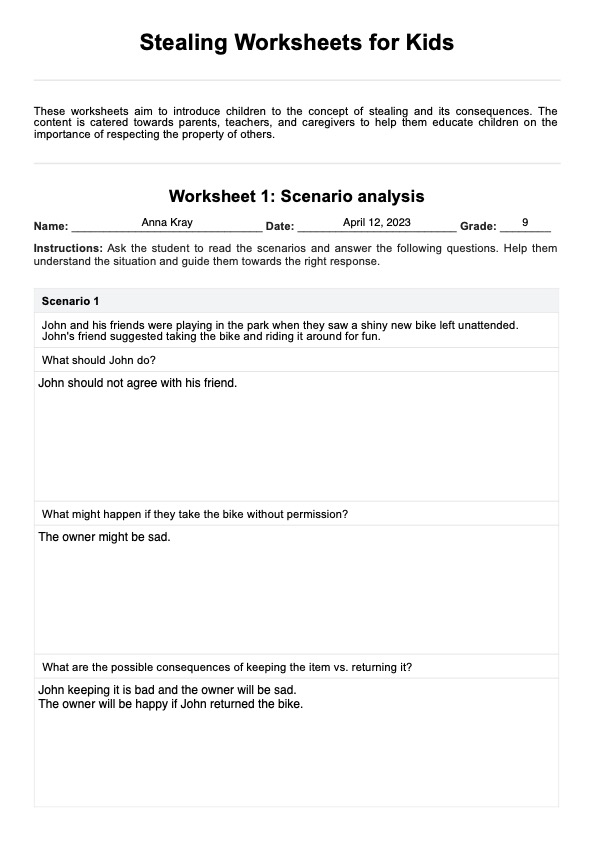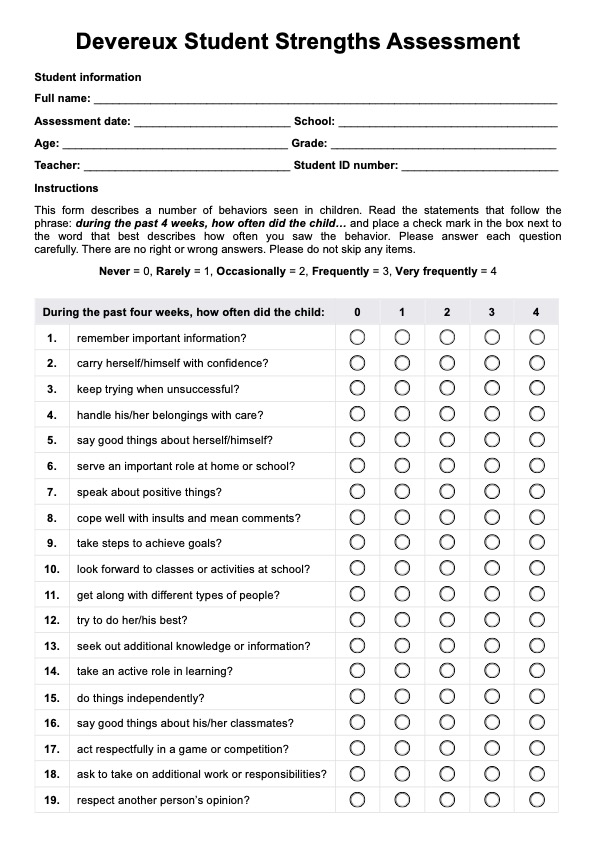Stealing Worksheets for Kids
Discover free downloadable stealing worksheets for kids to teach important values about ownership and consequences. Perfect for teachers and parents!


Why do children steal?
Children may steal out of curiosity, peer pressure, or a lack of understanding about ownership and consequences. Younger children might take things they want without realizing it’s wrong, while older kids might be influenced by peers or use stealing to express anger or inadequacy. Addressing these behaviours early is crucial in helping them develop a sense of morality and responsibility.
Stealing Worksheets for Kids Template
Stealing Worksheets for Kids Example
Stealing worksheets are educational resources designed to help children understand the implications of stealing - like why stealing is wrong, the consequences it can bring, and how it affects others. The activities typically involve scenarios, reflection questions, and practical advice to support and guide children in learning about honesty, responsibility, and integrity.
Examples of Stealing Worksheets for Kids
The stealing worksheets provided are tailored to help children understand and reflect on the ethical considerations of stealing through various engaging exercises. These worksheets are carefully designed to challenge and guide children in evaluating different situations where theft could occur, promoting a deeper understanding of personal responsibility and the impact of their actions on others. Here’s an introduction to one of the worksheets:
Scenario analysis worksheet
This worksheet encourages children to analyze scenarios in which a character is in trouble or tempted to steal. They discuss the situation and reflect on possible outcomes and better choices. Through this exercise, children develop critical thinking skills and empathy, understanding the "what" and "why" behind actions and consequences.
Role-playing activities
Children are given roles in these activities to act out various theft situations. This method helps them experience firsthand the emotional effects of stealing, such as guilt and sadness, and how it affects the person who is the victim. Role-playing also allows kids to practice responding when they might feel tempted to steal, reinforcing positive behavior patterns.
Consequence mapping grid
This structured worksheet helps children visually map out the short-term and long-term consequences of stealing. By filling out a grid, they can see the cascade of negative outcomes that can arise from one person or act of stealing, a concept that helps cement the concept that actions have repercussions.
The worksheets' structured approach educates children about their behavior and the moral implications of stealing and engages their creative and analytical minds to internalize the lessons learned.
How to use our stealing worksheets template
Understanding the implications of stealing is essential to moral and ethical education for children. Our stealing worksheets are designed to help educators and parents guide children through the complexities of this topic engagingly and thoughtfully. Here’s how to effectively use these worksheets in your teaching or parenting approach.
- Download the template: Download the Stealing Worksheets for Kids using the link on this page or via the Carepatron app.
- Introduce the topic: Start the session by discussing the importance of understanding and respecting personal property. Explain why stealing is harmful and affects both the individual and the community.
- Work through the worksheets: Guide the children through the worksheets. Encourage them to think critically and express their thoughts and feelings on the different scenarios presented.
- Discuss the outcomes: After completing the worksheets, have a group discussion to further understand the implications of stealing. Encourage children to share their thoughts and listen to their peers' perspectives.
- Reflect on personal experiences: Have children reflect on any personal experiences with stealing or witnessing someone else steal. This can help them understand the impact of such actions and how they can avoid falling into similar situations in the future.
Using the stealing worksheets is not just about teaching children right or wrong; it's about fostering an environment where they can develop a strong ethical foundation.
Engaging in these activities teaches children valuable life skills that contribute to their overall social and moral development.
Let these worksheets serve as a bridge to open and honest discussions about the consequences of stealing and the importance of integrity.
Benefits of using this worksheet
The stealing worksheets offer significant advantages for parents in both educational and parental settings, fostering key values in young learners:
Promotes honesty and integrity
These worksheets help children understand the idea, concept, and importance of honesty and integrity by engaging with real-life scenarios and reflective questions. They encourage kids to consider the moral implications of their actions and the benefits of making ethical choices.
Enhances empathy
The worksheets provide situations that might steal and require children to think about the feelings of others affected by stealing. This helps kids develop empathy, as they consider the emotional impact their actions can have on peers and community members.
Encourages critical thinking
Children learn to evaluate situations critically through guided discussions and practice scenario analysis and explore outcomes based on varying behavior choices. This critical thinking is crucial for moral and cognitive development.
Facilitates open discussion
These worksheets catalyze discussions about difficult topics. They provide a safe and structured environment for children to express their thoughts and learn from the experiences of others, which is essential for comprehensive learning.
Supports behavioral change
The worksheets help children internalize why stealing food is wrong and how they can handle similar situations constructively in the future by mapping out the consequences of stealing and providing positive alternatives.
Using these worksheets equips children with more responsibility and the tools to make responsible decisions and understand the broader consequences of their actions, reinforcing a foundation of moral behavior beyond the classroom, school or home.
Commonly asked questions
Starting as young as preschool is beneficial for introducing kids to basic concepts of right and wrong.
They are excellent for classroom settings or small groups to encourage discussion and perspective-taking.
Yes, Carepatron provides resources suitable for educational and home settings to support learning across environments.

.jpg)





















-template.jpg)














































































